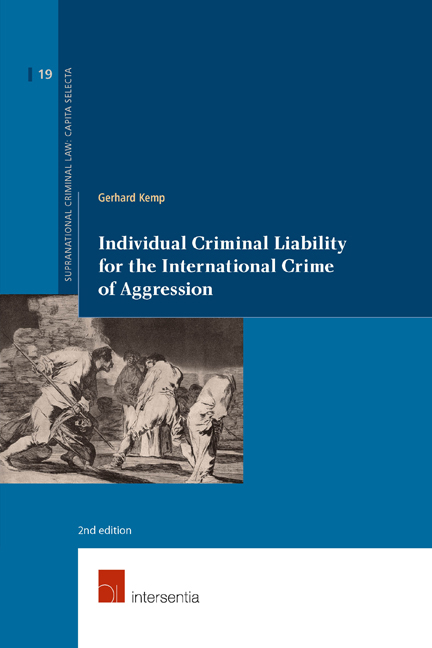Book contents
- Frontmatter
- Foreword to the Second Edition
- Foreword to the First Edition
- Preface
- Contents
- List of Abbreviations
- PART I INTRODUCTION AND FRAMEWORK OF ANALYSIS
- PART II COLLECTIVE SECURITY AND THE JUS CONTRA BELLUM
- PART III THE CRIMINALISATION OF AGGRESSION
- PART IV THE INTERNATIONAL CRIMINAL COURT AND THE CRIME OF AGGRESSION
- Chapter V The Inclusion of Aggression in the Rome Statute of the International Criminal Court
- Chapter VI Drafting and Diplomacy: The Special Working Group on the Crime of Aggression
- Chapter VII The Crime of Aggression under the Rome Statute of the ICC
- PART V NATIONAL AND REGIONAL CRIMINALISATION AND PROSECUTION OF THE CRIME OF AGGRESSION
- PART VI ANNEXES
Chapter VI - Drafting and Diplomacy: The Special Working Group on the Crime of Aggression
from PART IV - THE INTERNATIONAL CRIMINAL COURT AND THE CRIME OF AGGRESSION
Published online by Cambridge University Press: 12 December 2017
- Frontmatter
- Foreword to the Second Edition
- Foreword to the First Edition
- Preface
- Contents
- List of Abbreviations
- PART I INTRODUCTION AND FRAMEWORK OF ANALYSIS
- PART II COLLECTIVE SECURITY AND THE JUS CONTRA BELLUM
- PART III THE CRIMINALISATION OF AGGRESSION
- PART IV THE INTERNATIONAL CRIMINAL COURT AND THE CRIME OF AGGRESSION
- Chapter V The Inclusion of Aggression in the Rome Statute of the International Criminal Court
- Chapter VI Drafting and Diplomacy: The Special Working Group on the Crime of Aggression
- Chapter VII The Crime of Aggression under the Rome Statute of the ICC
- PART V NATIONAL AND REGIONAL CRIMINALISATION AND PROSECUTION OF THE CRIME OF AGGRESSION
- PART VI ANNEXES
Summary
THE PROCESS TO ADOPT A DEFINITION OF AGGRESSION AND CONDITIONS FOR THE EXERCISE OF JURISDICTION BY THE ICC
The aim of this chapter is to describe and analyse some of the important debates and processes that resulted in the adoption of the necessary amendments to the Rome Statute to provide for effective ICC jurisdiction over the crime of aggression. The different approaches that emerged in the aftermath of the Rome Conference are highlighted. The aim is not to reproduce or summarise the travaux préparatoires of the adoption of the amendments to the Rome Statute of the ICC at the 2010 Review Conference in Kampala. That has been done elsewhere. Where appropriate, reference is made to the relevant drafts, nonpapers, reports, country proposals and other relevant materials.
IN THE AFTERMATH OF THE ROME DIPLOMATIC CONFERENCE: THE PROPOSALS AT THE PREPARATORY COMMISSION
Since the adoption of the Rome Statute of the ICC in 1998, the process prompted by Article 5(2) to find a suitable definition of aggression, involved many discussions at diplomatic and legal-technical level. A number of issues remained to be finalised, inter alia the Elements of Crimes and the Rules of Procedure and Evidence. At the first session of the Preparatory Commission (which had the task of carrying these processes forward) a group of states (mainly the states from the Non-Alignment Movement (NAM) as well as a number of Arab states) insisted that the issue of the crime of aggression be put on the agenda as well. Although the aggression question was not a priority at that stage, the NAM and Arab states made sure that the issue was put on the agenda for the second meeting of the Preparatory Commission.
During the first number of meetings of the Preparatory Commission, three distinct approaches to the question of a definition for aggression and conditions for the exercise of jurisdiction of the ICC emerged. The three approaches were reflected in proposals represented to a special coordinator on the issue of aggression. Proposal 1 (by the Arab and NAM states) was a compilation of proposals that were made before, during and after the Rome Diplomatic Conference of 1998. It reflected a very broad approach to the crime of aggression and included references to the UN General Assembly Definition of Aggression of 1974.
- Type
- Chapter
- Information
- Publisher: IntersentiaPrint publication year: 2015

